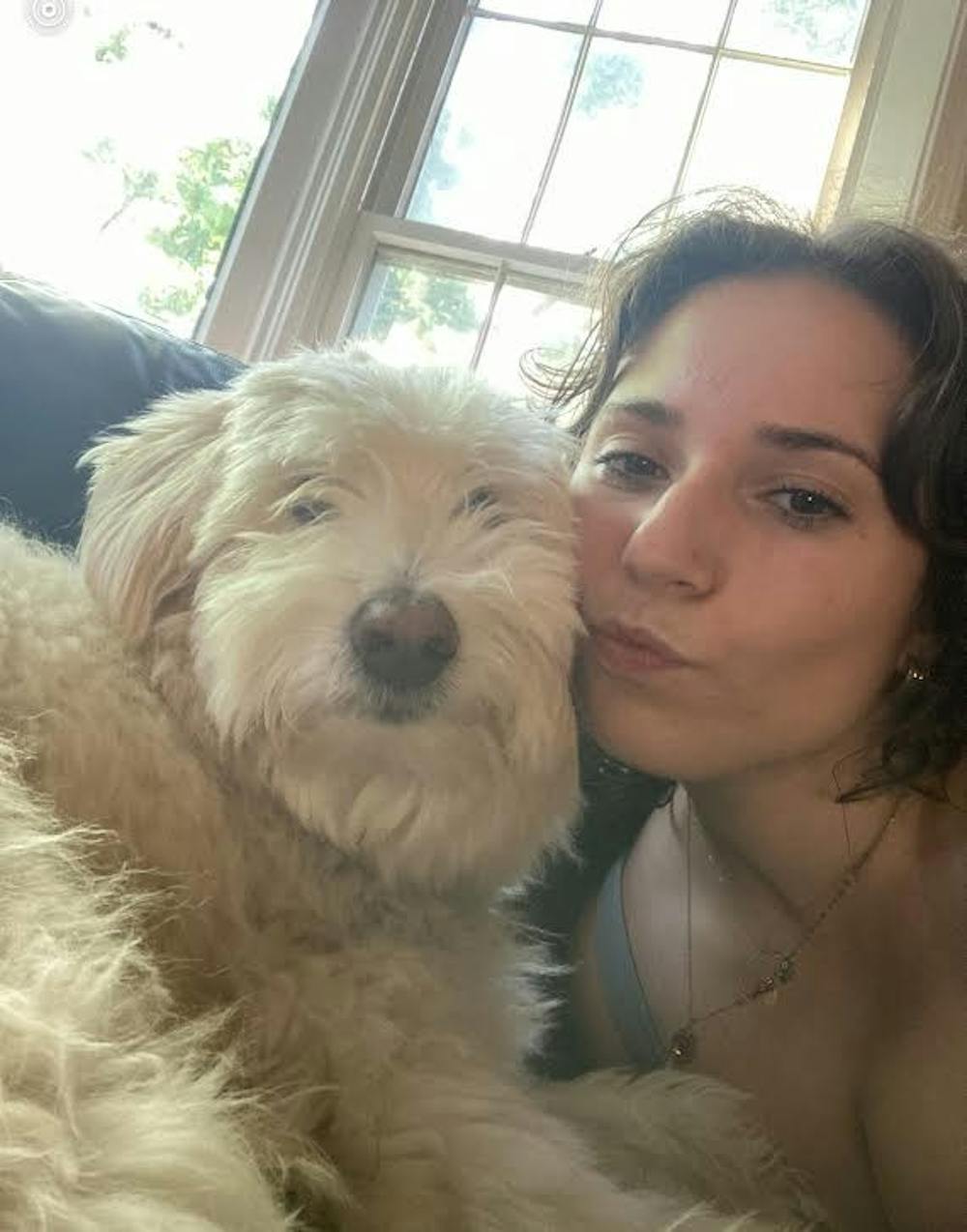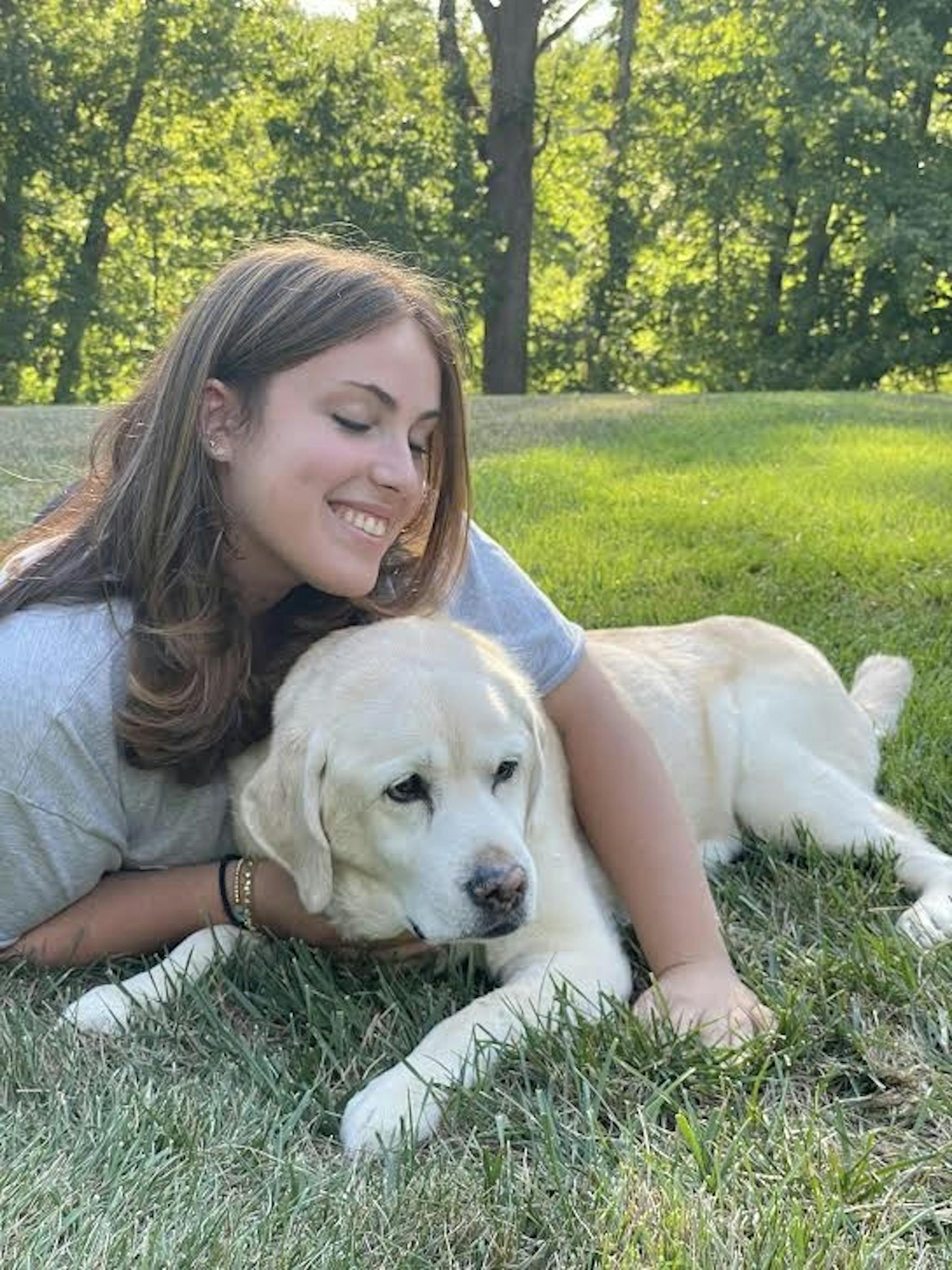Navigating the complexities of pet death as a college student
Many of us struggle to identify and name the stigma and grief that occurs in mourning the loss of a close, furry friend.
Content warning: this article discusses issues pertaining to depression, pet death, and grief.
Throughout childhood and adolescence, our pets are there for us. From curling up on our laps after we bomb the SAT to licking our fingers after gobbling down buffalo wings from Wingstop, the unconditional love that they provide can be a grounding force. They are a blessing. And like any other kind of grief, it can feel insurmountable to move on from their passing.
I’ve had my mini-goldendoodle, Buddy, for 12 years now. He has anxiety, a picky appetite, and an unfathomable love for my father, whom he refuses to separate from. Though he’s attached to my dad at the hip, Buddy is my lifeline. I spent years cutting chunks of his hair for fun, applying blue eye shadow to his bushy eyebrows, and forcing him into my lap during dinner so I could feed him some of my leftover chicken. Buddy is the reason I look forward to going home during breaks and the reason I sob on my ride back to school.
Buddy turns 13 in April. To my family and I’s despair, he was also recently diagnosed with cancer. My parents and I have been told that he will likely die within the next few months. I am the fifth person of my close friends to endure this experience while at Brandeis. Pet death is tough — it’s a phenomenon that even the most mentally-well struggle to cope with. The death of a pup who has been your best friend and most reliable companion is quite a unique experience, yet sadly, one many of us have faced.

Jessie and her dog, Buddy.
The average lifespan of a dog is 10 to 13 years. Though there’s a wide range of flexibility with those numbers considering the breed and size of each dog, that’s not so long in human years. Additionally, since the COVID-19 pandemic, one third of college students are depressed, compared to seven percent of all adults. These statistics indicate that college students are more prone to emotional and mental difficulties than the general population of adults and might take the death of a dog or close pet particularly hard.
Lexi Lazar ’24 recently lost her beloved dog, Molli, in the middle of the busy semester: “She was my best friend in the entire world. She lived to be 15, and she passed away two weeks ago today,” Lazar told the Justice in a March 18 interview.
Stigma surrounding pet deaths
Psychology Today discussed the challenges that emerge from pet deaths in comparison to the loss of a human connection, one being that grieving the loss of a pet publically and emotionally is generally taboo, promoting the harmful idea that pet losses are not very important.
It’s evident that pet losses have serious impacts. Lazar described herself as “catatonic” while grieving Molli: crying every day for a week and unable to complete her schoolwork on time. Though some of Lazar’s professors were accommodating to her need for extensions and extra academic support, others were not. Lazar explains that she was planning to travel home to Philadelphia after her dog’s death to mourn with her family, but when she asked one of her professors for a midterm extension, they insisted she take it on the assigned date. She did so, but felt hurt and frustrated. “When professors show that much of a lack of compassion, I feel like that just really shows a lack of understanding for what’s going on with people,” she said. She also emphasized that not being granted accommodations for the space she needed to process Molli’s passing “was very detrimental to my grieving process.”
Psychology Today also reminds us that “grief is a natural response to the loss of a valued relationship, whether with humans or animals” and that “validat[ing] and honor[ing]” grief allows one to get through the overwhelming pessimism and depression over time. By ignoring pleas for accommodations following the loss of a pet, professors devalue the significance and impact of students’ relationships with their pets and do not show a respect for the students’ well-being outside of class. As Lazar said, “not allow[ing] yourself to grieve … is not healthy.”
Other extremities of pet deaths
Some individuals fear the death of their pet so much that they avoid the death completely. Lazar said her father has a hard time dealing with pet deaths because in his childhood, his mother sold their dogs before they got extremely old in order to avoid their inevitable deaths. Lazar believes “that really hurt him,” as he wasn’t able to stay connected with his animals “every step of the way.” Now, with the loss of Molli, her dad is dealing with grieving a pet for the first time.
This is another reason why allowing the process of grief is so important: experiencing grief earlier in life can help you understand your feelings toward and after other deaths later on. Lazar’s dad is still impacted today by his family’s fear of dealing with a pet’s death. This continues to affect the family as they decide whether it’s worth it to adopt another dog and deal with the emotional ramifications of replacing Molli and with another dog loss in the future.
Sometimes, pets die with little notice to the owners, provoking more extreme sadness and confusion. Bridget Niemeyer ’24 explained in a March 18 interview with the Justice that, while at college, she received a call from her family explaining that they would have to put her dog, Georgie, down that day. They told her that Georgie was unable to stand up that morning, so her parents took him to the vet, who found a sudden abundance of tumors in Georgie’s body. Niemeyer described the shock she was in and said she “couldn't do schoolwork for days.”
Georgie was Neimeyer’s “bud,” though she said he “wasn’t the most loving pet” and “would bite people who he felt bad energies about.” But Neimeyer admired this about him: Georgie's sense about people was “right every time.”
An absence in the home and the heart
Neimeyer said losing a pet created a huge hole in her life. “My pets are my favorite members of the house. I look forward to seeing them more than seeing anyone else.” When she went home during academic breaks after Georgie died and before her family got a new pup, her house felt much emptier.
Every day, I think about how I’ll react to Buddy’s death. I’m sure I’ll cry and ignore my work and look at silly photos in my phone that I’ve taken of him over the years. I know I’ll grieve, and while it saddens me that so many of my friends have also gone through such a tragic experience that I will soon endure, I’m also so fortunate to have people around me who understand the pain of losing a childhood dog.
“I’m not mad about the grief,” Lazar said. “If I can start my day with such intense emotions about [Molli], it just shows me how much love there is in me for her … I’ve moved out of the house, and in a way, she’s moving out too.”

Daniel Gabel sits by a bonfire with Buddy on his lap.



Please note All comments are eligible for publication in The Justice.